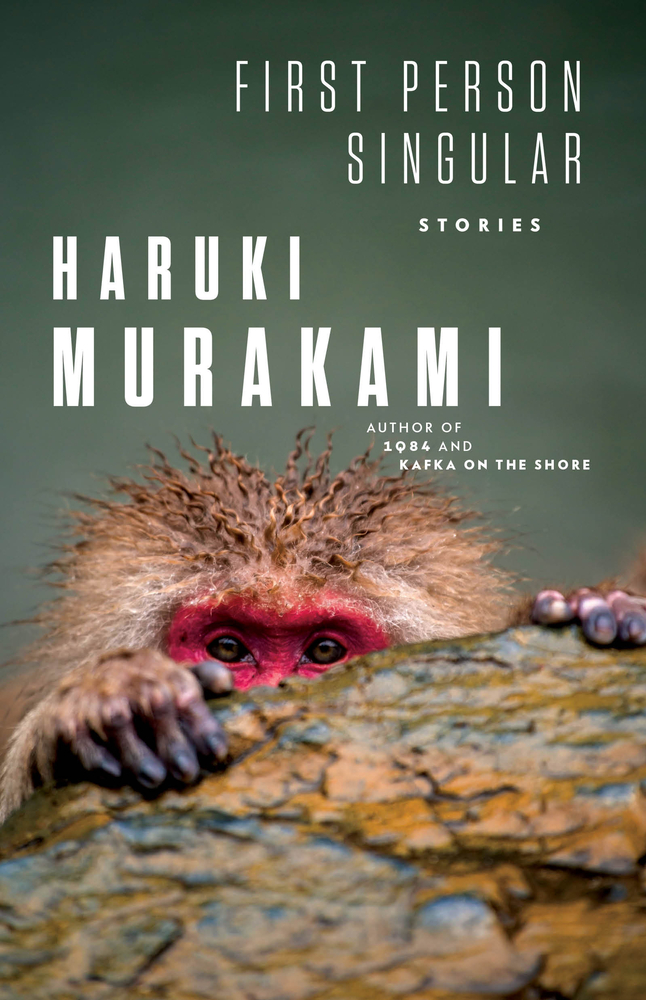Review by Tina deBellegarde
Memoir or fiction? Murakami blurs the line between the two in First Person Singular, his most recent collection of stories where he tackles time, dreams, and memory (its power, lapses and distortions). He demonstrates how we wish into existence and remember into existence memories we are unwilling to abandon, such as how a one-night stand or a girl running down a high school hallway can stay with us and leave a lasting imprint.
First Person Singular (translated by Philip Gabriel) is reminiscent of Murakami’s previous collection of short stories The Elephant Vanishes in that all the stories are told in the first person and in Murakami’s famous conversational style. Some stories are other-worldly while others are based in the mundane. This volume has less punch and polish than The Elephant Vanishes and, as such perhaps should not serve as an introduction to Murakami, but nonetheless, these stories remain a welcome read for Murakami fans.
This collection is solid, recognizable Murakami with the usual attention to music, whiskey, sex and baseball. The stories are diverse: a mysterious philosophizing old man in an abandoned park; a one-night stand with a tanka poet; a Charlie Parker dreamscape where Parker plays bossa nova from an imaginary album; a life-long obsession with a girl the narrator once saw carrying a Beatles album; a talking monkey masseur with a fetish for stealing women’s names; a platonic attachment to a charismatic woman; an homage to the Tokyo Yakult Swallows baseball team where he remembers poetry he never wrote; and the titular story where an encounter with a stranger forces him to regret actions he doesn’t remember.
Some stories are clearly autobiographical, such as the one about his life-long attachment to the Yakult Swallows. Others just feel like actual experiences, still others are pure fantasy, but all are told with the same casual conversational tone that gives you the sense you’re sitting across from the author over a coffee or whiskey, sharing his memories.
Simply told tales of memory and reckoning, Murakami investigates how we form our identities and how certain encounters are powerful in that formation. Every story starts early in the narrator’s life, with a tale of an encounter, and then takes a leap forward many years to reflect upon a memory. The reckoning that comes with the passage of time and the assessment of the life lived is the crux of these narratives.
Murakami is adept at capturing a slice of life—something ordinary—but with a strong sense of time and place. Even in his trademark magical-realism, Murakami evokes the mundane to immerse the reader in the ordinariness of the narrator’s life. A good example is “With the Beatles” where Murakami takes an unremarkable moment and constructs an entire story around it. In high school, the narrator encounters an unknown girl running down the corridor clutching a Beatles album. He never sees her again, not in high school and not later in life, yet he measures every subsequent girl and woman by the feeling he had at the sight of this girl.
Murakami best sums up these moments with this quote from the end of “Carnaval:”
“…a pair of minor incidents that happened in my trivial little life. Short side trips along the way. Even if they hadn’t happened, I doubt my life would have wound up much different from what it is now. But still, these memories return to me sometimes, traveling down a very long passageway to arrive. And when they do, their unexpected power shakes me to the core. Like an autumn wind that gusts at night, swirling fallen leaves in a forest, flattening the pampas grass in fields, and pounding hard on the doors to people’s homes, over and over again.”
In a novel, especially a modern one which addresses shortened attention spans, a conversation in a park or attendance at a baseball game might not make it into the book. The character in the novel may very well have such an encounter, but unless it leads to the development of the plot, the scene would be edited out. It is that so-called insignificant encounter that Murakami focuses on to develop beautiful short stories. He lingers in these stories and savors the moments in a way a novel cannot.
Similar to movie director Akira Kurosawa, Murakami is sometimes considered too Western by the Japanese literary establishment. In my opinion, however, his Japanese-ness sneaks in via kishōtenketsu, the Japanese literary tradition where a major conflict is not necessary. Kishōtenketsu has an introduction, a development, a twist (often not a major conflict) and a wrap up where the protagonist is not necessarily deeply changed but adjusts to the new normal. Kishōtenketsu relies more on the evolution of a character through natural change versus the destructive nature of conflict so prevalent in the West. Some of Murakami’s works have dramatic twists and disruption, but many, especially his short stories, have only minor twists, and this collection of stories is particularly so.
I read this book while listening to the music mentioned in the stories as I do with every Murakami book. In the past I have made my own playlists, but this time there was one posted on Spotify. Make sure to find it. Murakami deserves to be read accompanied by the music he has coursing through his mind.
I get the distinct impression that Murakami writes for himself. It is clear that he is having fun while tackling existential questions. You must suspend disbelief to enjoy the flights of fancy Murakami undertakes to tell his story. Accept his invitation to go along for the journey and you will enjoy him.
For more Murakami books, reviews and trivia, see the BOA Issue 6: What You Don’t Know About Haruki Murakami.


